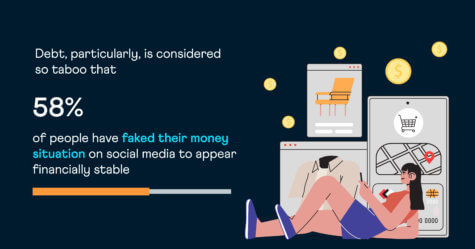NEW YORK — More than half of Americans feel embarrassed talking to others about their finances. A survey of 2,000 adults examined their relationship with money and found that 56 percent believe talking about finances with others is “taboo.”
Although most are not sure why money talk may be taboo (81%), respondents say the most controversial money-related topics are asking about their parents’ finances (51%), debt (45%), and wills (43%). Debt, in particular, is such a taboo topic that nearly three in five people distort their actual money situation on social media to appear financially stable (58%).
Although three in four respondents (76%) describe themselves as an “open book,” in reality, 63 percent confess they would never discuss finances at the family dinner table.
Conducted by OnePoll in partnership with Questis, the study delved further into Americans’ financial woes. Sixty percent say they’ve woken up in the middle of the night thinking about their finances. Two in three find themselves wide awake due to feeling that they’re not where they should be financially in life.
Respondents would rather watch a scary movie (30%), speak in front of a large audience (27%), or sit in two hours of traffic (28%) than think about their financial issues. Unfortunately, those worries also follow people into other areas of their life, with 83 percent saying they’d feel guilty about treating themselves to pleasures like a shopping day or vacation knowing while financially in the red.
Should salaries be public knowledge?
When it comes to work, more than half of employed respondents find themselves secretly wishing they knew how much money their co-workers make. Another seven in 10 wish job descriptions would list salary ranges so they could avoid asking awkward questions during interviews.
On the bright side, people are looking to debunk the stigma surrounding finances, with 58 percent claiming they’d be comfortable talking about their finances with their colleagues. Within relationships, 45 percent of respondents think it’s only okay to discuss finances after marriage, moving in together, or getting engaged. Despite that, only half of respondents are likely to discuss finances with their spouses.
Interestingly, people admitted they’re almost as likely to talk to a complete stranger about their finances (24%) as they are their co-workers (29%).
“It’s so critical for people to feel comfortable having financial conversations with the important people in their lives,” says Questis CEO and founder John Tabb in a statement. “Being able to get on the same page with shared financial goals can make it easier to make the necessary changes that will help you reach those goals. It can improve communication in other areas of the relationship too.”

More money, less problems
Most respondents are willing to talk about their finances if it would help others feel more confident about theirs (64%). There’s also strength in numbers, as a similar percentage agree they’d be more open about their finances if others were just as open about theirs (63%).
Thirty-five percent of Americans also say they would feel more comfortable talking about finances if they had more money.
Another 42 percent say they would feel supported if they spoke to others with similar goals or financial situations. Similarly, 43 percent would feel more comfortable with support from an unbiased financial professional.
Still, 66 percent admit they only learned what they know about finances by making mistakes first.
“One of the reasons that a lot of financial coaches are drawn to this profession is because we’ve made our own financial mistakes and now want to help others benefit from our experience,” says Dr. Martha Menard, head of financial coaching at Questis. “Having open and nonjudgmental financial conversations can make such a difference for people because everyone does money differently. Saving and investing for the long term doesn’t mean you can’t enjoy life here and now. It’s all about finding a balance that works for you and aligning your spending with your values.”

I guess there thinking about while out eating, shopping, and traveling. Cause every restaurant, store, and hotel is packed out. What a bunch of nonsense. No one is worried about finances!!!
Let’s Go Brandon
This is, of course, derivative of standards in the workplace. Employers have successfully created an environment in which it is a faux-pas to discuss your pay, because… (big surprise!) they don’t want to pay you more. By making finance a taboo topic in the workplace, they prevent workers from discussing with one another how much each is making, often for similar or same work, and thereby prevent workers from pushing for pay equal to higher earners. All of this, obviously, in supplication to the old Protestant Work Ethic, by which economic might is economic right, and by which employers have something approaching a divine mandate to pay themselves as much as possible while paying those below them as little as possible. We’ve just secularized it and detached it from its prior religious significance in the nascence of our nation of immigrants and religious cast-offs.
So, what does this have to do with discussing finance with friends and family? We Americans work more than most other people on the planet. We work more than serfs and peasants did in medieval Europe. We spend more time away from our families and more time being influenced by the social structures at play in our working environments. As work/life balance becomes further and further eroded, so too do personal values get ground down and attrited under the values of our workplaces.
By virtue of literal, mere exposure to these values, they gradually subvert our more basic values. Because we spend so much time at work, the workplace values become our personal values. We find ourselves averse to discussing finance on a subconscious, behavioral level. Sure, we might be able to rationalize it away (for those of us who have more self-awareness than perhaps the norm) but it is ultimately an axiomatic belief that talking finance is bad. We just get used to it and it becomes our own.
All of this is in service to the same structures which are CAUSING THE FINANCIAL DIFFICULTY they are simultaneously shaming us out of discussing. It’s an absolute racket. Talk about your finances with your coworkers. Normalize it. Who cares if Sally at the water cooler gives you a stink-eye for it because she’s up for promotion and is next in line to reap the benefits of that hush-hush policy?
American work culture is broken. It’s breaking what’s left of our broader, American identity as well.